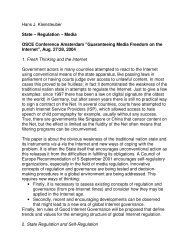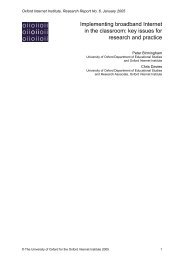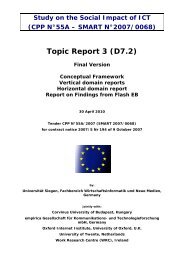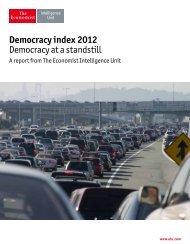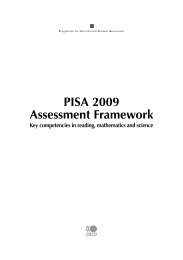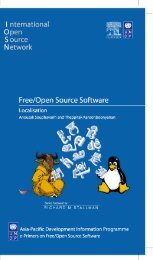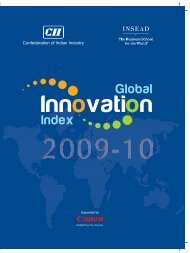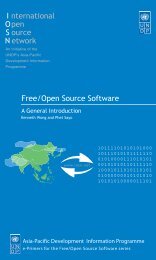J U N E 2 0 1 1<strong>Internet</strong> <strong>Freedom</strong>A <strong>Foreign</strong> <strong>Policy</strong> <strong>Imperative</strong> <strong>in</strong> <strong>the</strong> <strong>Digital</strong> <strong>Age</strong>6 |matter <strong>in</strong> political change, and that both dissidentsand dictators act on that basis.Most attention has focused on technologies thatallow dissidents to penetrate restrictive firewallsand communicate securely. But fund<strong>in</strong>g technologycomprises just one aspect of America’s<strong>Internet</strong> freedom agenda. The United States alsoadvocates <strong>in</strong>ternational norms regard<strong>in</strong>g freedomof speech and onl<strong>in</strong>e assembly and opposesattempts by autocratic governments to restrictlegitimate onl<strong>in</strong>e activity.The private sector has a critical role to play <strong>in</strong>promot<strong>in</strong>g <strong>Internet</strong> freedom, but, given corporate<strong>in</strong>terests <strong>in</strong> maximiz<strong>in</strong>g profits ra<strong>the</strong>r thanpromot<strong>in</strong>g onl<strong>in</strong>e freedom <strong>in</strong> repressive environments,efforts to expand its role are difficult.Ethical debates, rang<strong>in</strong>g from whe<strong>the</strong>r Americancompanies should be permitted to sell repressiveregimes key technologies to <strong>the</strong> responsibilitiesof corporations <strong>in</strong> <strong>the</strong> face of an autocracies’demand for <strong>in</strong>formation, rema<strong>in</strong> unresolved. And<strong>the</strong> o<strong>the</strong>r side of this co<strong>in</strong> – whe<strong>the</strong>r U.S. exportcontrols should prohibit sell<strong>in</strong>g technologies thatcould be used to promote onl<strong>in</strong>e freedom – isoften overlooked.To date, <strong>the</strong> U.S. government has shied awayfrom articulat<strong>in</strong>g fully <strong>the</strong> motivations beh<strong>in</strong>d its<strong>Internet</strong> freedom agenda. Adm<strong>in</strong>istration officialsemphasize that <strong>the</strong>ir policy supports freedom of<strong>the</strong> <strong>Internet</strong>, not freedom via <strong>the</strong> <strong>Internet</strong>, andthat <strong>the</strong> <strong>Internet</strong> freedom agenda is not part of abroader strategy to support democratic evolution.It should be.Admittedly, promot<strong>in</strong>g <strong>Internet</strong> freedom is complicated,and <strong>in</strong>volves <strong>in</strong>herent tensions witho<strong>the</strong>r U.S. foreign policy, economic and nationalsecurity <strong>in</strong>terests. This is particularly true <strong>in</strong> <strong>the</strong>area of cyber security. Cyber security expertsseek to secure <strong>the</strong> United States aga<strong>in</strong>st cyberattacks, for example, by push<strong>in</strong>g for greater onl<strong>in</strong>etransparency and attribution, while <strong>Internet</strong>freedom proponents urge greater onl<strong>in</strong>e anonymity.While tensions between <strong>Internet</strong> freedom andcyber security are real, and <strong>in</strong> some cases will forcedifficult choices, <strong>the</strong>y should not prevent robustU.S. efforts to advance both.A robust <strong>Internet</strong> freedom agenda should reflect<strong>the</strong> follow<strong>in</strong>g eight pr<strong>in</strong>ciples:Pr<strong>in</strong>ciple 1: Embrace a ComprehensiveApproachU.S. policymakers should <strong>in</strong>corporate <strong>Internet</strong>freedom <strong>in</strong>to <strong>the</strong>ir decision-mak<strong>in</strong>g (especiallyon cyber security and economic diplomacyissues); convene private sector professionals,export controls experts, diplomats and o<strong>the</strong>rs toexplore new ways of promot<strong>in</strong>g <strong>Internet</strong> freedom;and use traditional diplomacy to promote<strong>Internet</strong> freedom.Pr<strong>in</strong>ciple 2: Build an International Coalitionto Promote <strong>Internet</strong> <strong>Freedom</strong>The U.S. government should convene a core groupof democratic governments to advocate <strong>Internet</strong>freedom <strong>in</strong> key <strong>in</strong>ternational fora; urge governmentsto encourage foreign companies to jo<strong>in</strong> <strong>the</strong>Global Network Initiative (GNI); and ensure that<strong>the</strong> Secretary of State gives her next major addresson <strong>Internet</strong> freedom <strong>in</strong> a foreign country, possibly<strong>in</strong> Europe alongside key European Union (EU)commissioners.Pr<strong>in</strong>ciple 3: Move Beyond CircumventionTechnologiesThe U.S. government should cont<strong>in</strong>ue to fundtechnologies o<strong>the</strong>r than firewall-evasion tools,<strong>in</strong>clud<strong>in</strong>g those that help dissidents ma<strong>in</strong>ta<strong>in</strong>digital security, ensure mobile access and reconstitutewebsites after a cyber attack. The U.S.government should offer f<strong>in</strong>ancial awards to fostertechnological <strong>in</strong>novation, require that any onl<strong>in</strong>etool receiv<strong>in</strong>g U.S. fund<strong>in</strong>g be subjected to an<strong>in</strong>dependent security audit and expand <strong>the</strong> sources
of technology fund<strong>in</strong>g to <strong>in</strong>clude foreign governments,foundations and <strong>the</strong> private sector.Pr<strong>in</strong>ciple 4: Prioritize Tra<strong>in</strong><strong>in</strong>gThe State Department, along with <strong>the</strong> U.S. <strong>Age</strong>ncyfor International Development (USAID), shouldcont<strong>in</strong>ue to foster <strong>Internet</strong> freedom through targetedtra<strong>in</strong><strong>in</strong>g programs, <strong>in</strong>clud<strong>in</strong>g education ononl<strong>in</strong>e safety.Pr<strong>in</strong>ciple 5: Lead <strong>the</strong> Effort to BuildInternational NormsThe U.S. government should promote a liberalconcept of <strong>Internet</strong> freedom <strong>in</strong> all relevant fora,and reject attempts by authoritarian states to promotenorms that restrict freedoms of <strong>in</strong>formationand expression onl<strong>in</strong>e. It should also pursue an<strong>in</strong>ternational transparency <strong>in</strong>itiative to encouragegovernments to publicize <strong>the</strong>ir policies on restrict<strong>in</strong>gonl<strong>in</strong>e <strong>in</strong>formation.Pr<strong>in</strong>ciple 8: Reform Export ControlsThe U.S. government should relax controls on technologiesthat would permit greater onl<strong>in</strong>e freedomwhile protect<strong>in</strong>g American national security, andeducate companies on <strong>the</strong> precise nature of exportcontrol restrictions so that companies do not overcomplyand deny legal technologies to dissidentsabroad.In addition, we offer several recommendationsfor technology companies, <strong>in</strong>clud<strong>in</strong>g provid<strong>in</strong>gdissidents basic technical assistance to better usebuilt-<strong>in</strong> security functions for software and hardware;better <strong>in</strong>form<strong>in</strong>g users and <strong>the</strong> public aboutwho may access <strong>the</strong> data <strong>the</strong>y control and underwhat conditions; <strong>in</strong>creas<strong>in</strong>g corporate transparencyabout foreign government requests; and advocat<strong>in</strong>gfor <strong>in</strong>creased <strong>Internet</strong> freedom.Pr<strong>in</strong>ciple 6: Create Economic Incentivesto Support <strong>Internet</strong> <strong>Freedom</strong>U.S. officials should cont<strong>in</strong>ue to articulate <strong>the</strong>economic case for <strong>Internet</strong> freedom, backed whereverpossible by solid quantitative evidence, andpush for <strong>Internet</strong> censorship to be recognized as atrade barrier.Pr<strong>in</strong>ciple 7: Streng<strong>the</strong>n <strong>the</strong> Private Sector’sRole <strong>in</strong> Support<strong>in</strong>g <strong>Internet</strong> <strong>Freedom</strong>Congress should adopt laws that prohibitAmerican corporations from giv<strong>in</strong>g autocraticgovernments <strong>the</strong> private data of dissidents when<strong>the</strong> request is clearly <strong>in</strong>tended to quash legitimatefreedom of expression, and that requirecompanies to periodically disclose requests itreceives for such data to <strong>the</strong> U.S. government.U.S. officials should cont<strong>in</strong>ue to urge companiesto jo<strong>in</strong> <strong>the</strong> GNI, but also encourage <strong>the</strong>mto develop broad unilateral codes of conductconsistent with <strong>the</strong> GNI. They should also publiclyhighlight specific bus<strong>in</strong>ess practices, bothpositive and negative.| 7



